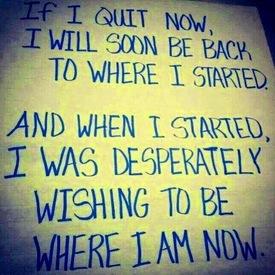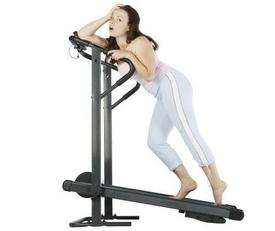We are pleased to announce that as of March 4, 2025, an updated Rich Text Editor has been introduced in the MyFitnessPal Community. To learn more about the changes, please click here. We look forward to sharing this new feature with you!
Walk5kms Vs run5kms burn same amount of calories?

Janehds0284
Posts: 87 Member
With the same distance (say 5kms) walk and run will burn the same cal or run would burn more because you sweat more?
0
Replies
-
Interesting question. Sweat doesn't really play into it, as you can sweat sitting down, but exertion vs time taken exercising is interesting. Obviously there's more exertion running, but for the same distance you'll be exercising longer if you walk.
So I just calculated with mfp to see what it said. For me: walking 5km leisurely comes in at 211 calories (75 minutes walking, truly leisurely)
Walking 5km briskly also comes in at 211 calories (45 minutes walking)
Running 5km at 5min/km or 12kph is 294 calories (25 minutes running)
running FTW!
Edited for typo0 -
Now I know! Thanks
 !! 0
!! 0 -
Think of it this way.. when you run , you're generating lift as well as horizontal movement. That upward push on every step adds up!0
-
For most people on average, add 50 calories for every mile you run vs walking. It adds up when you're running more than 4miles.
A.C.E. Certified Personal and Group Fitness Trainer
IDEA Fitness member
Kickboxing Certified Instructor
Been in fitness for 30 years and have studied kinesiology and nutrition
0 -
The "issue" is that, if you run, you burn more glycogen in the muscles as compared to the walking which burns more fat.
Practicly, if losing weight is what you are after, walk. as much as you can.
If gainign shape and getting fit is what you are after, run.0 -
Walking at a high incline > running. Unless you run very fast.
So, it depends.0 -
It really depends... On intensity, time. I can run 5k in about 33 minutes (I'm not fast, I know) at about 215 cals. I can walk 5k in 45 minutes at about 225 cals. So similar cal burns, but by running I invest less time.
It also becomes a question of which can you do longer? If you can't run a great distance, or don't enjoy running, then walking may be the better option for you.0 -
Oh, I always thought it was the same amount of calories just with the running you just get it over faster. But shoot wat do I know I never ran a mile in my life , but I want to .0
-
alexpopescu0 wrote: »The "issue" is that, if you run, you burn more glycogen in the muscles as compared to the walking which burns more fat.
Practicly, if losing weight is what you are after, walk. as much as you can.
If gainign shape and getting fit is what you are after, run.
NONONONONONONONONONONONONONONONONONONONONONONONONONONONONONONONONONONO
NO
0 -
I found this article helpful. (I think the formulas only apply to running/walking on flat surfaces.)
http://www.runnersworld.com/weight-loss/how-many-calories-are-you-really-burning?page=single
Your Net Calorie Burn/Mile
Running 0.63 x your weight
Walking 0.30 x your weight
The walking formulas apply to speeds of 3 to 4 mph. At 5 mph and faster, walking burns more calories than running.0 -
alexpopescu0 wrote: »The "issue" is that, if you run, you burn more glycogen in the muscles as compared to the walking which burns more fat.
Practicly, if losing weight is what you are after, walk. as much as you can.
If gainign shape and getting fit is what you are after, run.
Where the energy comes from while you are exercising doesn't matter (same problem with arguments for fasted training). Your net energy out vs. energy in is what matters -- you will end up burning more fat over the course of the day if you have a higher deficit, so if running burns more calories (and you don't eat more to compensate) then you will burn more fat overall.
A wrinkle is that you can probably sustain a higher deficit if you mostly just walk vs. doing something more intense like running. Anyway, it all comes down to goals, what a reasonable deficit is, and what you enjoy. But running can certainly be a good aid to fat loss.0 -
alexpopescu0 wrote: »The "issue" is that, if you run, you burn more glycogen in the muscles as compared to the walking which burns more fat.
Practicly, if losing weight is what you are after, walk. as much as you can.
If gainign shape and getting fit is what you are after, run.
What? Not even close to true.
0 -
Bumping up this thread because I had a similar question. Yesterday, my knees hurt so I took it easy on the elliptical where I'd normally be doing HIIT. (My goal is to lose weight and my trainer recommended HIIT to burn fat). I just stayed on longer and hoped to compensate a little. At the end of my workout, I'd burned more calories than I had been burning with HIIT (as measured by a heart rate monitor with a chest strap.)
So the question is will I get better long term results with HIIT, or by longer sessions with higher calorie burns? I prefer the latter - it's easier on my knees. For the record, I do resistance training (weights, body weight, etc) 3x a week, and cardio 5 to 6 times a week.0 -
-
Triplestep wrote: »Bumping up this thread because I had a similar question. Yesterday, my knees hurt so I took it easy on the elliptical where I'd normally be doing HIIT. (My goal is to lose weight and my trainer recommended HIIT to burn fat). I just stayed on longer and hoped to compensate a little. At the end of my workout, I'd burned more calories than I had been burning with HIIT (as measured by a heart rate monitor with a chest strap.)
So the question is will I get better long term results with HIIT, or by longer sessions with higher calorie burns? I prefer the latter - it's easier on my knees. For the record, I do resistance training (weights, body weight, etc) 3x a week, and cardio 5 to 6 times a week.
Do whatever makes you feel good and you can sustain. I walk every day slow as molasses. That gets me only the 100 calories/mile. Sometimes I jog after work and use a HRM. Because I am obese, and a beginner at running, it typically gives me 120-140 calories/mile. But it's easier to make myself get out there and walk. And I can walk for a lot longer than I can run now.0 -
The answer is still 'no' but you are right about consistency. Also some joggers are REALLY slow & injured looking... A brisk walk would do their bodies good. I am a walker through & through. I use the extra time for deep thoughts :-)0
-
@blues4miles you are getting enough activity.
http://www.statnews.com/2016/01/28/exercise-energy/
The sourced study:
http://www.cell.com/current-biology/abstract/S0960-9822(15)01577-8
Whenever I do an activity, it is to get better at something. It might be to improve my cardiovascular health, strengthen my core so I can do more things, or improve my upper body strength so I can go on hiking trips.
Activity all by itself helps modulate my diet but it does not help me lose weight.
Ultimately, I diet so I can do stuff. I don't do stuff so I can quit dieting.0 -
Triplestep wrote: »Bumping up this thread because I had a similar question. Yesterday, my knees hurt so I took it easy on the elliptical where I'd normally be doing HIIT. (My goal is to lose weight and my trainer recommended HIIT to burn fat). I just stayed on longer and hoped to compensate a little. At the end of my workout, I'd burned more calories than I had been burning with HIIT (as measured by a heart rate monitor with a chest strap.)
So the question is will I get better long term results with HIIT, or by longer sessions with higher calorie burns? I prefer the latter - it's easier on my knees. For the record, I do resistance training (weights, body weight, etc) 3x a week, and cardio 5 to 6 times a week.
Depends on your goals. A lot of people like HIIT because it can burn a lot of calories (although not as many as is sometimes claimed) in a shorter period of time and also can provide cardio benefits without requiring a long time doing cardio (for those who dislike it). Also, there are some training benefits to getting into the anaerobic zone and working in higher intensities for shorter periods of time, in addition to longer slower workouts.
If you don't mind spending more time and prefer the long slow workout, and have no training reason to do intervals, I'd say stick with that, even before hearing that your knees prefer it. You will still get cardio benefits and burn calories, and building up endurance isn't a bad thing at all.0 -
Walking you always have one foot on the ground. Running there is a period of time when you are not touching the ground. To accomplish this you must use muscle power to lift your weight from the ground.
Here are the calculations I use;
run - multiply .63 times your weight times the miles
walk - multiply .30 times your weight times the miles
ie; .30 times 200 pounds equals 60 times 3.1 miles (5k) equals 186 calorie burn for a 5k walk
If you walk faster than four minutes per mile you can increase the .30
Some calculators will give higher numbers because they figure gross calories which include your base metabolism. The calculations above give you the net calories which are the result of the exercise only.0
This discussion has been closed.
Categories
- All Categories
- 1.4M Health, Wellness and Goals
- 391.6K Introduce Yourself
- 43.5K Getting Started
- 259.7K Health and Weight Loss
- 176.1K Food and Nutrition
- 47.5K Recipes
- 232.7K Fitness and Exercise
- 444 Sleep, Mindfulness and Overall Wellness
- 6.5K Goal: Maintaining Weight
- 8.6K Goal: Gaining Weight and Body Building
- 153.1K Motivation and Support
- 7.8K Challenges
- 1.3K Debate Club
- 96.3K Chit-Chat
- 2.5K Fun and Games
- 4K MyFitnessPal Information
- 16 News and Announcements
- 936 Feature Suggestions and Ideas
- 2.8K MyFitnessPal Tech Support Questions
















